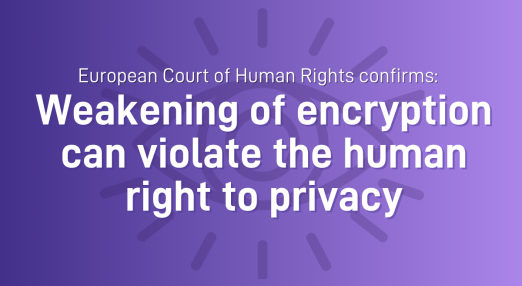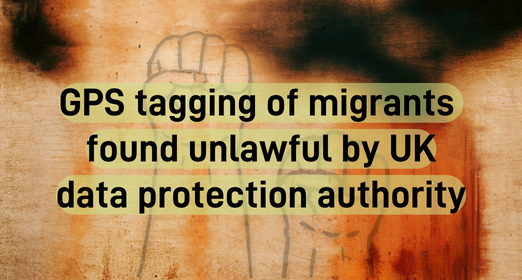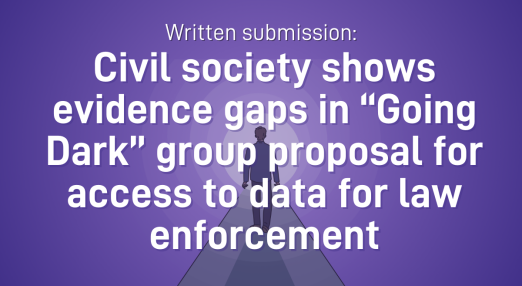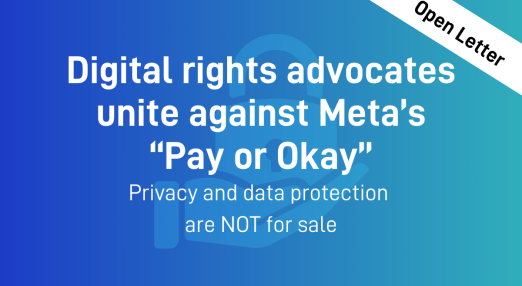EDRi-gram, 20 March 2024
On March 13, following years of tireless advocacy, the EU Parliament finally passed the Artificial Intelligence (AI) Act. But there’s not much to celebrate – the law missed the mark when it comes to protecting our human rights, especially those of migrants and people on the move. On the same day, the Parliament also passed the European Media Freedom Law (EMFA) which aims to protect journalists and media workers. Another legislation with lofty ambitions that did not live up to its goals. Despite the Brussels spyware scandal that shocked up in February 2024, EU’s approach to surveillance technology remains lackadaisical at best. What will finally convince them to take action?
Filter resources
-

EDRi-gram, 20 March 2024
On March 13, following years of tireless advocacy, the EU Parliament finally passed the Artificial Intelligence (AI) Act. But there’s not much to celebrate – the law missed the mark when it comes to protecting our human rights, especially those of migrants and people on the move. On the same day, the Parliament also passed the European Media Freedom Law (EMFA) which aims to protect journalists and media workers. Another legislation with lofty ambitions that did not live up to its goals. Despite the Brussels spyware scandal that shocked up in February 2024, EU’s approach to surveillance technology remains lackadaisical at best. What will finally convince them to take action?
Read more
-

European Court of Human Rights confirms: weakening of encryption can violate the human right to privacy
In a milestone judgment - Podchasov v. Russia - the European Court of Human Rights (ECtHR) has ruled that weakening of encryption can lead to general and indiscriminate surveillance of the communications of all users and violates the human right to privacy.
Read more
-

GPS tagging of migrants found unlawful by UK data protection authority
As a result of Privacy International’s 2022 complaint against the UK Home Office, the UK data protection authority (ICO) has found that the GPS tagging of migrants and asylum seekers arriving to the UK small boats was unlawful, and issued a formal warning for all future data protection compliance of GPS tagging as a whole. This is a major step towards better scrutiny of the human rights implications of the surveillance of migrants.
Read more
-

Will the Brussels spyware scandal finally convince the EU to act?
In February, Brussels was rocked by reports of phone hacking and spyware attacks on members of the European Parliament’s defence and security committee. Such intrusions are a huge threat to EU democracy — interfering with decision-making and allowing obstructive disruptions to public debate. Three weeks on, nothing seems to have changed with the EU’s approach to spyware.
Read more
-

Privatised municipal surveillance on the stage of security theatre in Slovenia
The municipality of Ljubljana, the capital of Slovenia, wasted almost two years deflecting freedom of information requests (FOIAs) from EDRi member Državljan Dsfor the municipal CCTV system data in the city. The data, when finally provided, revealed the scale of ineffective security theatre paid for by Ljubljana’s citizens, and the need for a public debate about the use of this technology.
Read more
-

Written submission: Civil society shows evidence gaps in “Going Dark” group proposal for access to data for law enforcement
On 28 February 2024, EDRi and its members submitted written comments on the work of the High-Level Group (HLG) on “access to data for effective law enforcement". This HLG was set up under the Swedish Presidency of the Council in 2023 to allegedly find solutions to law enforcement ‘modern challenges’ in the digital era.
Read more
-

Open letter: Digital rights advocates unite against Meta’s “Pay or Okay”. Privacy and data protection are NOT for sale
In response to three Data Protection Authorities (DPAs) requesting a European Data Protection Board (EDPB) opinion on Meta's 'Pay or Consent' approach, Access Now, the EDRi office and other EDRi members have united in an open letter urging the Board to reject these subscription-based approaches unequivocally.
Read more
-

Delay, depress, destroy: How tech corporations subvert the EU’s new digital laws
When the DSA and DMA were passed in 2022, major tech industry associations praised the new laws as significant achievements. It is time for Big Tech corporations to stop pouting and live up to their responsibility.
Read more
-

Bits of Freedom launches campaign on DSA user rights
EDRi member in the Netherlands Bits of Freedom has launched a campaign to bring attention to user rights addressed by the European Union's new digital law, the Digital Services Act. On the brand new website, that engages civil society, you can find guidelines on how to enforce your own platform rights.
Read more
-

The privacy saga with Norwegian Social Service continues
We promised you an update to Janne Cecilie Thorenfeldt’s case taking the Norwegian Labour and Welfare Administration (NAV) on the European Court of Human Rights (ECHR). Since EDRi member Elektronisk Forpost Norge (EFN) reported about the massive GDPR violations of the Service, here is what happened.
Read more
-

EDRi-gram, 06 March 2024
On 17 February, one of the landmark digital laws, the Digital Services Act, in the European Union came fully into force. Now, you've got a whole bunch of fantastic online rights at your fingertips. But don't worry, we've got your back! Our friends at Bits of Freedom have whipped up a shiny new website packed with easy-peasy actions to help you understand and flex those digital rights muscles like a pro. But wait, there's more! We're thrilled to introduce you to our new Head of Policy, Ella Jakubowska. Ella takes up this role from her previous EDRi position as Senior Policy Advisor, where she led advocacy on facial recognition, the confidentiality of online communications, age verification and more. She’ll be spending the coming months listening and learning, so please get in touch if you’d like to talk all things digital rights policy.
Read more
-

#PrivacyCamp24: Event summary
On January 24, 2024, we brought together policymakers, activists, human rights defenders, and academics from all over Europe for Privacy Camp 2024. We came together to explore the theme ‘Revealing, Rethinking, and Changing Systems’.
Read more
